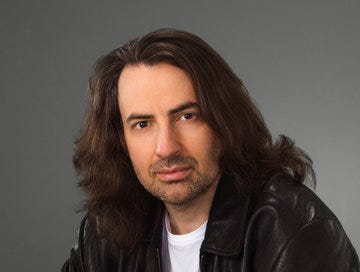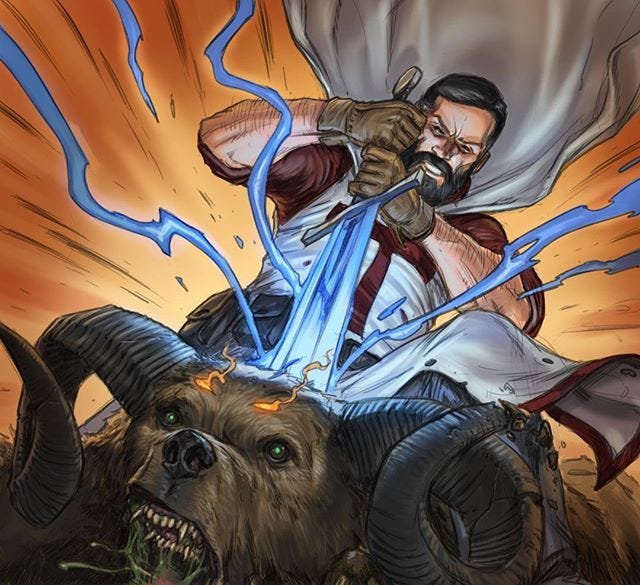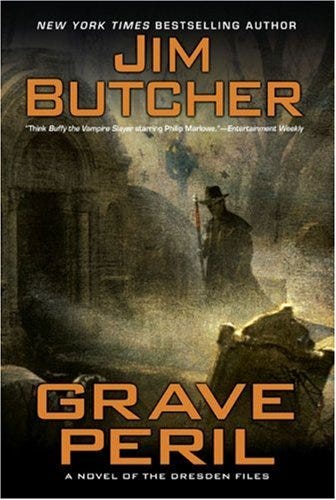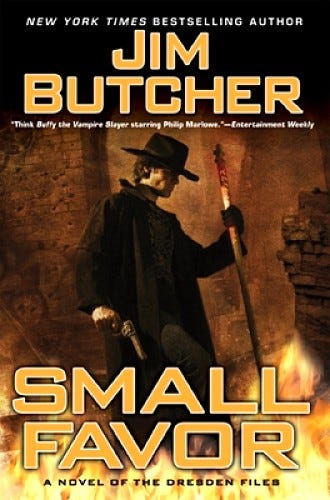Let’s take a brief break from the various flavors of Catholicism and discuss a much neglected Catholic apologist, Jim Butcher. Butcher is the author of the bestselling series, The Dresden Files, which is about Harry Dresden, a hardboiled private eye in Chicago who is also a wizard. While not a theologically or morally perfect series by any stretch, I’d argue that Butcher in his Dresden Files has likely done more to put a positive image on the Catholic Church than anyone in the last 20 years. All that, and Butcher isn’t even a practicing Christian (at least not that I’m aware). Butcher did a lot to influence my mental image of Catholicism when I was a teenager.
The series came out in 2000 and Butcher has written 17 Dresden stories since then. I began reading The Dresden Files in 2006 when I was fourteen years old. I had never read something so action-packed and dramatic, and I was instantly hooked. Harry was a snarky, but lovable rogue. He said and did all the impulsive and recklessly heroic things all adolescent boys want to say and do. He was always punching above his weight class as well as helping out the little guy. He rescued damsels in distress and was chivalrous to a fault. Butcher is sure not to let Dresden off the hook for all Harry’s rash decisions; there are always consequences. While not hopeless, Harry is proud, sometimes underhanded, and often does evil for the sake of good. He is constantly uncertain of whether or not he is actually a good man. His life is also lonely and fairly miserable, again making him question whether doing the right thing is worth it.
Harry’s foibles aside, I wanted to highlight one of Butcher’s characters who serves as a foil to Harry and had a significant impact on my moral imagination. Michael Carpenter first appeared in the third installment of the series, Grave Peril, in 2001. He has appeared in 11 stories since then and may as well be considered one of the main characters. Michael is a devout Catholic, father of 7 children, a carpenter (yup) by trade, and a Knight of the Cross. Being a Knight, he wields the sword Amoracchius, a European broadsword with one of the nails from Christ’s Crucifixion worked into the hilt. Harry calls him the “Fist of God”. There are up to three Knights at any given time, given that there are three nails.
The nails are visible — Dresden does his best to convince himself that it’s rust, not blood, on the nail in the hilt of Michael’s sword in Grave Peril. They are worked into the metal of the blade, at the base, just above the guard, point toward the end of the blade.
As a Knight, Michael’s main job is to fight The Order of the Blackened Denarius, which is a group of 30 fallen angels who inhabit the silver coins given to Judas for betraying Christ. The demons in the coins make deals with humans to give them power and magical abilities at the cost of their souls. The Knights fight to free the humans from this demonic enslavement. Harry and Michael have fought the Order’s leader, Nicodemus Archleone, multiple times.
Michael even rescued his future wife Charity from a dragon, which is a great first date.
In Proven Guilty, Siriothrax is mentioned as the dragon killed by Michael Carpenter to rescue his future wife Charity Carpenter. After Molly Carpenter was abducted by a Fetch, sitting in the upper pews of the balcony at Saint Mary of the Angels, Charity Carpenter told Harry Dresden the story of how Michael rescued her from Siriothrax. She had been traded to Siriothrax by Gregor in exchange for power. Charity only remembered being beaten by Gregor when she resisted and chained to an iron post by Siriothrax.
Michael works as a character because he acts as a literary foil to Harry. He is honest, loyal, and completely self-sacrificing. He exemplifies meekness, properly understood as a martial virtue. He is calm and cool under pressure and only uses violence when absolutely necessary. Both Michael and Harry serve to draw out each other’s strengths and Michael helps as a corrective to keep Harry on the path to God (or at least keep him from being totally evil).
The best part of Michael’s character is that Butcher plays it straight. There is no post-modern deconstruction of Michael or Catholicism to be found. He is a real, devout Catholic and an interesting, fleshed-out character. He doesn’t have crippling depression, abuse his children, or is an alcoholic. The God he serves is the God of the Old and New Testaments and again, Butcher plays it straight. In this way, he serves as Harry’s Lawful Good, paladin counterpart, although both ultimately fight on the same side. There are other Catholic characters as well, such as Fr. Forthill, who are also heroic in their own right.
Butcher excels at making virtue desirable; no small feat for any author. Virtuous characters in any medium are rare these days, but somehow Butcher has created multiple in the same series. Even Harry knows that Michael is a better man than he, but Michael can see something good in Harry that even Harry might not know is there.
From Grave Peril:
I returned his stare, uncertain. Michael had insisted that I look him in the eyes on our first meeting. When a wizard looks you in the eyes, it’s serious. He can see inside of you, all of your dark secrets and hidden fears of your soul—and you see his in return. Michael’s soul had made me weep. I wished that my soul would look like his had to me. But I was pretty damned sure that it didn’t. Silence fell. All the little babies hushed.
The Power that Michael serves is very real. Even Harry acknowledges that reality. Harry doesn't so much doubt the existence of God, he doubts that he is worth saving. It is also hinted that he would also need to give up practicing magic as he knows it if he became a practicing Catholic.
Michael represents the old-school version of masculine heroism as Harry represents the newer anti-hero. If anything, the series is an exploration of both types of heroism and may even be seen as a critique of the anti-hero. As Harry becomes more of a monster, and drifts down the path to perdition, Michael, as God’s Knight, is there to give him hope and pull him back from the brink.
From Small Favor:
He took a deep breath and spoke carefully. “Harry,” he said quietly, “what happened to your blasting rod?”
For a second the question didn’t make any sense. The words sounded like noises, like sounds infants make before they learn to speak. Especially the last part of the sentence. “I … I’m sorry,” I said. “What did you say?
“Where,” he said gently, “is your blasting rod?”
This time I heard the words.
Pain stabbed me in the head, ice picks plunging into both temples. I flinched and doubled over. Blasting rod. Familiar words. I fought to summon an image of what went with the words, but I couldn’t find anything. I knew I had a memory associated with those words, but try as I might, I couldn’t drag it out. It was like a shape covered by some heavy tarp. I knew an object was beneath, but I couldn’t get to it.
“I don’t … I don’t … “ I started breathing faster. The pain got worse.
Someone had been in my head.
Someone had been in my head.
I must have fallen at some point, because the work-shop’s floor was cold underneath one of my cheeks when I felt Michael’s broad, work-calloused hand gently cover my forehead.
“Father,” he murmured, humbly and with no drama whatsoever. “Father, please help my friend. Father of light, banish the darkness that he may see. Father of truth, expose the lies. Father of mercy, ease his pain. Father of love, honor this good man’s heart. Amen.”
Michael’s hand felt suddenly red-hot, and I felt power burning in the air around him — not magic, the magic I worked with every day. This was something different, something more ancient, more potent, more pure. This was the power of faith, and as the heat settled into the spaces behind my eyes, something cracked and shattered inside my thoughts.
It is difficult to estimate how much this series influenced my return to the Catholic Church. I think it helped remove barriers and prejudices that would have been there otherwise. Seeing a well-written character like Michael as the epitome of Christian virtue made Catholicism attractive, or at least it provided an alternative view to the prevailing cultural narrative. It also helped that Michael was not the protagonist of the series. He is sprinkled into the narrative enough to add a layer of depth without being overbearing or preachy. The focus is rightly on Harry and his struggle to walk the line between good and evil.
I will end with one of my favorite moments in The Dresden Files. I read this after I had come back to the Church, but it is representative of Michael’s character and his virtues. It is rather long but it is worth quoting.
From Skin Game:
And voices filled my ears. Thousands of whispering voices, hissing obscene, hateful things, vicious secrets, poisonous lies and horrible truths in half a hundred tongues all at once. I felt the pressure of those voices, coursing into my head like ice picks, gouging holes in my thoughts, in my emotions, and there was nothing, nothing I could do to stop them. I felt a scream building, one that would open my mouth, fill it with tiny, tearing bodies, and I knew that I couldn’t stop it.
And then a broad hand slammed down on the crown of my head, and a deep voice thundered, “Lava quod est sordium!”
Light burned through my closed eyelids, through the layers of insects covering them, and a furious heat spread down from the crown of my head, from that hand. It spread down, moving neither quickly nor slowly, and wherever it passed over my skin, as hot as scalding water in an industrial kitchen sink, the swarm abruptly vanished.
I opened my eyes to find Michael kneeling over me, Amoracchius in his left hand, his right resting on my head. His eyes were closed and his lips were moving, words of ritual Latin flowing over them in a steady stream.
Pure white fire spread down over my body, and I remembered when I had seen something similar once before—when vampires had attempted to manhandle Michael, many moons before, and had been scorched and scarred by the same fire. Now, as the light engulfed me, the swarm scattered, outer layers dropping away, while the slower inner layers were incinerated by the fire. It hurt—but the pain was a harsh, cleansing thing, somehow honest. It burned over me, and when the fire passed, I was free, and the swarm was scattering throughout the vault, pouring toward the tiny air vents spread throughout.
I looked up at Michael, gasping, and leaned my head forward. For a second, the pain and the fear still had me, and I couldn’t make myself move. I lay there, simply shuddering.
His hand moved from my head to my shoulder, and he murmured, “Lord of Hosts, be with this good man and give him the strength to carry on.”
I didn’t feel anything mystic. There was no surge of magic or power, no flash of light. Just Michael’s quiet, steady strength, and the sincerity of the faith in his voice.
Michael still thought I was a good man.
…
Nicodemus approached us with his expression entirely neutral, and eyed Michael.
“We needn’t fear further interference from Tessa. It will take her time to pull herself together. How did you do that?” he demanded.
“I didn’t,” Michael said simply.
Nicodemus and Deirdre exchanged an uneasy glance.
“All of you, hear me,” Michael said quietly. He turned and stood between them—fallen angels and monsters and scoundrels and mortal fiends—and me. “You think your power is what shapes the world you walk in. But that is an illusion. Your choices shape your world. You think your power will protect you from the consequences of those choices. But you are wrong. Your create your own rewards. There is a Judge. There is Justice in this world. And one day you will receive what you have earned. Choose carefully.
His voice resonated oddly in that space, the words not loud, but absolutely penetrating, touched with something more than mortal, with an awareness beyond that of simple space and time. He was, in that moment, a Messenger, and no one who heard him speak could doubt it.
Silence settled on the vault, and no one moved or spoke.








Coming very late to this because upon rereading the series as a Catholic I have decided that indeed it is one of the best depictions of goodness in literature. And Butcher really did his homework. At one point Fr Forthill quotes St Josemaria Escrivá, but only as “the founder of my order.” The real St Mary of the Angels, I learned during a visit yesterday, is actually run by Opus Dei! Under explored for sure, especially given how the Reddit threads on religion in Dresden can’t get past reading their own Percy Jackson-style religious pluralism into the series
I knew nothing about Jim Butcher. I'm glad he was the right read at the right time for you. In my mind I had to compare Harry Dresden and Michael Carpenter to my chief male characters in A Tale of Two Times. From what you’re said, Arron, I can believe that Butcher uses Catholic elements to maintain a dramatic tension in his stories which will appeal to a generally younger reader class than I've crafted. The readers I'm hoping to appeal to are older native agnostics who feel something of the pull of the spiritual, but don’t know what to do about it. So the Catholic element is the major invisible tension of the whole tale (all 980,000 words of it) not an stylistic element within it. My characters have the destiny, arising from an event which is pre Abrahamic, to engage the Ancient Foe under specific rules which call for them (the Clan of Thiuderieks) to treat him as a Friend, which, in fact, is what the god Sunderer calls himself. I know that from the overlap of atheism and agnosticism that many feel that they are being true heroes by suffering the dismal world without God as their duty to truth. The Tale's Chief masculine hero, Ricardo Chavez is meant to resonate with the overtones of that heroism of mental resolve. And, the element of dramatic tension comparable to Butcher's Harry/Michael is the contrast between the rank evil of the humans of the Circle of the Ancient Foe, many who have been with him for eight thousand years, and the more or less virtuous nature of humans of the Clan's War Thing. I can agree that portraying appealing virtue is a literary challenge. I hope that there are readers of the Tale for whom it’s the right read at the right time.